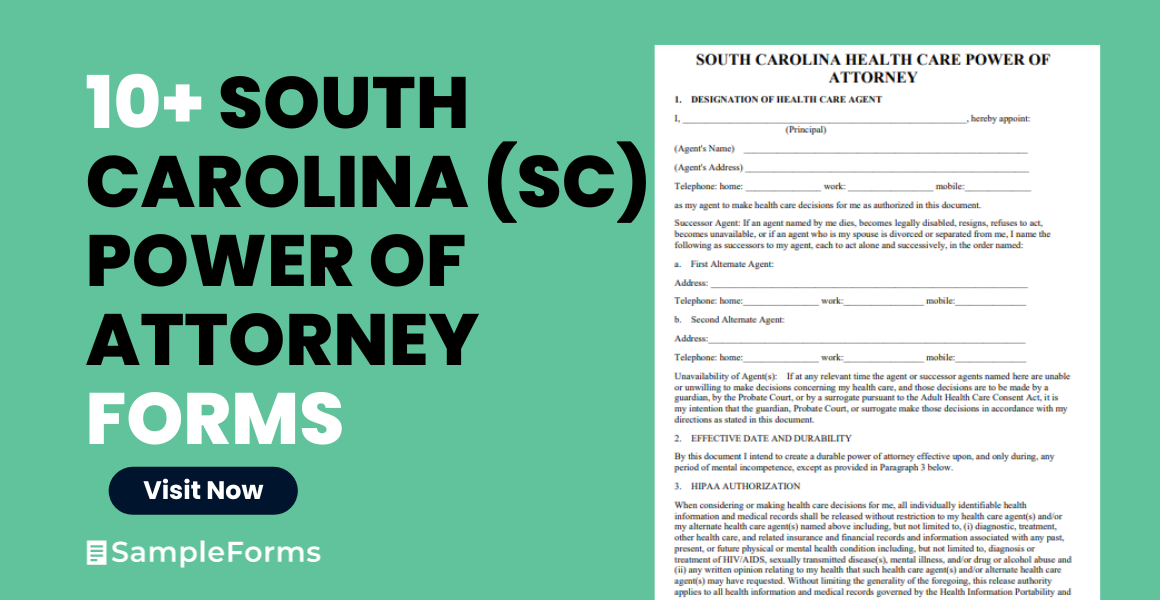Navigating the complexities of a South Carolina Power of Attorney (POA) Form can be daunting. This essential legal document grants authority to another person to make decisions on your behalf. Our guide provides invaluable tips and insights on how to use the form effectively, ensuring your wishes are respected. Whether for financial, health, or general matters, understanding the nuances of a POA in South Carolina is crucial for sound decision-making and peace of mind.
What is the South Carolina Power of Attorney Form?
A South Carolina Power of Attorney Form is a legal document that allows you to appoint someone else to manage your affairs. This could be for financial decisions, healthcare choices, or other personal matters. The person you choose, known as your ‘agent,’ will have the authority to act on your behalf. This form is crucial for planning ahead, ensuring that your matters are handled according to your wishes, especially if you’re unable to make decisions yourself.
What is the Best Sample South Carolina Power of Attorney Form?
Below is a sample South Carolina Power of Attorney form with fillable blanks. Please note that this is a basic template and may need to be customized to fit specific needs. It’s also important to consult with a legal professional to ensure that the form complies with current South Carolina laws and is appropriate for your particular situation.
South Carolina Power of Attorney Form
Principal’s Information:
- Name: [__________]
- Address: [__________]
- Phone Number: [__________]
Agent’s Information:
- Name: [__________]
- Address: [__________]
- Phone Number: [__________]
Powers Granted:
- Financial Decisions
- Real Estate Management
- Health Care Decisions
- Business Operations
- Other: [__________]
Special Instructions:
- [__________]
Effective Date:
- Immediately
- Upon Incapacity of Principal
- Date: [__________]
Duration:
- Indefinite
- Until Date: [__________]
Signature of Principal:
- [__________]
- Date: [__________]
Signature of Agent:
- [__________]
- Date: [__________]
Witnesses (if required):
- Name: [] Signature: [] Date: [__________]
- Name: [] Signature: [] Date: [__________]
Notary Acknowledgment:
- [Notary Public Section with Space for Stamp and Signature]
1. State of South Carolina Power of Attorney Form
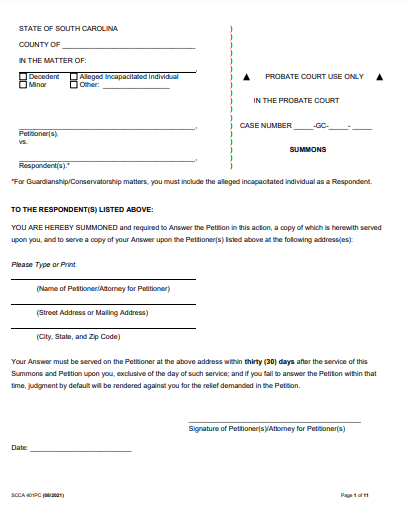
2. South Carolina Simple Power of Attorney Form
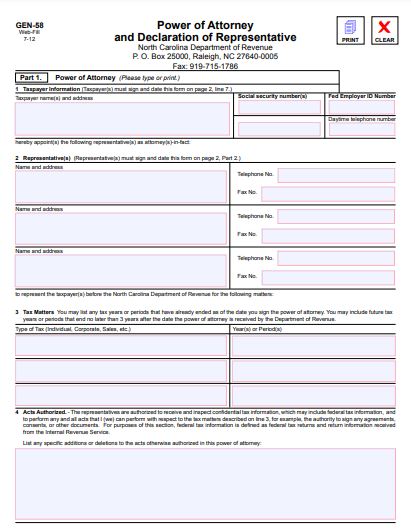
3. South Carolina Sample Power of Attorney Form
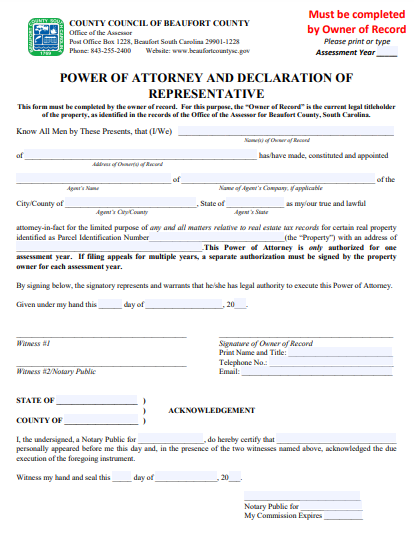
4. South Carolina Printable Power of Attorney Form
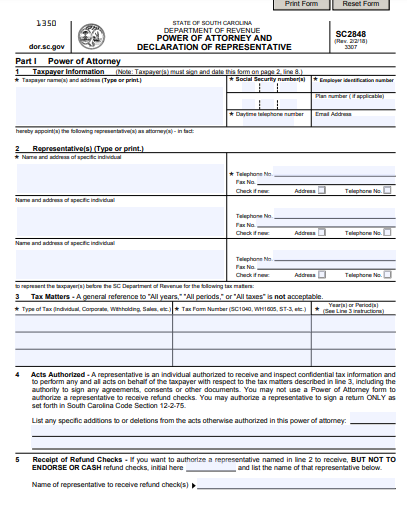
5. South Carolina Power of Attorney Form
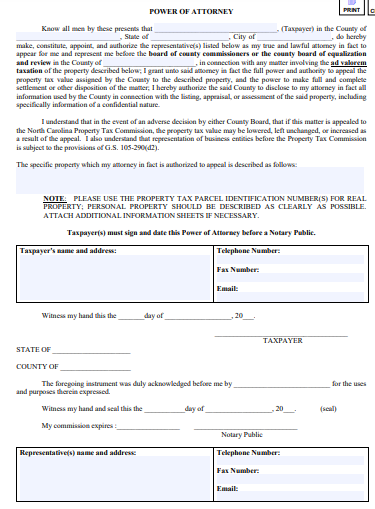
6. South Carolina Medical Power of Attorney Form
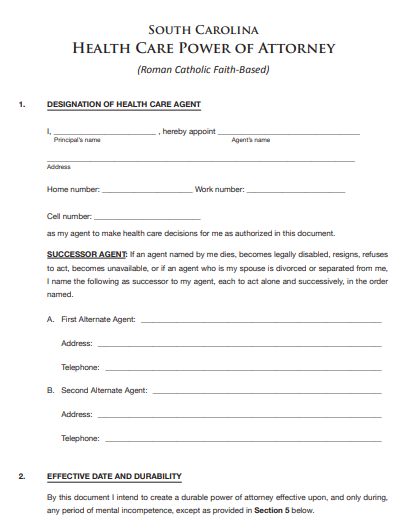
7. South Carolina Health Care Power of Attorney Form
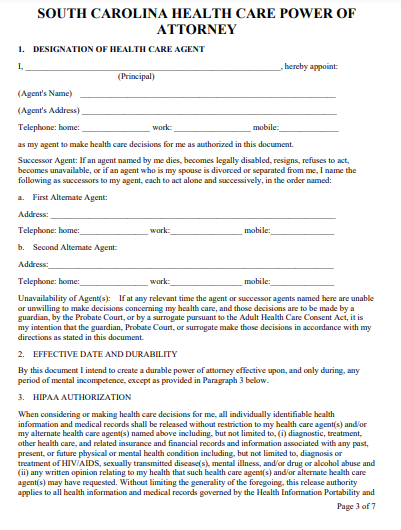
8. South Carolina General Power of Attorney Form
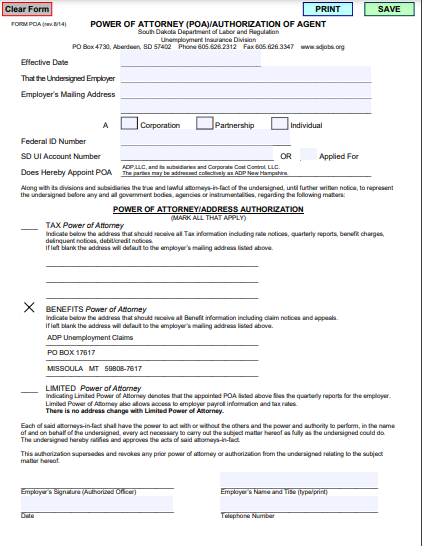
9. South Carolina Durable Power of Attorney Form
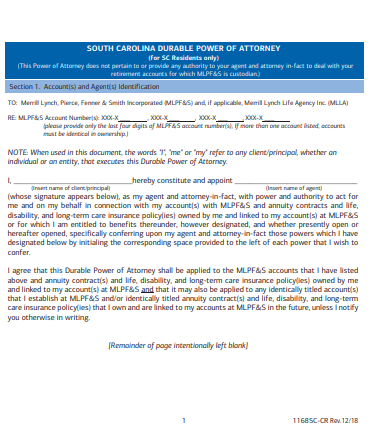
10. South Carolina Durable Financial Power of Attorney Form
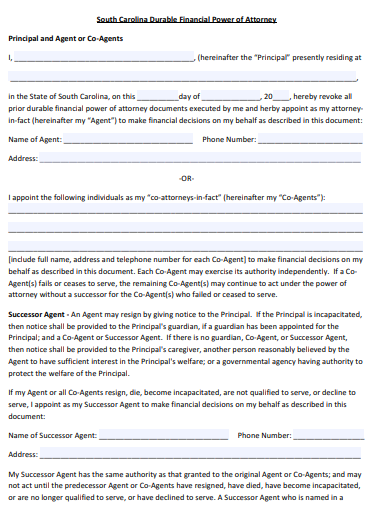
11. South Carolina Blank Power of Attorney Form
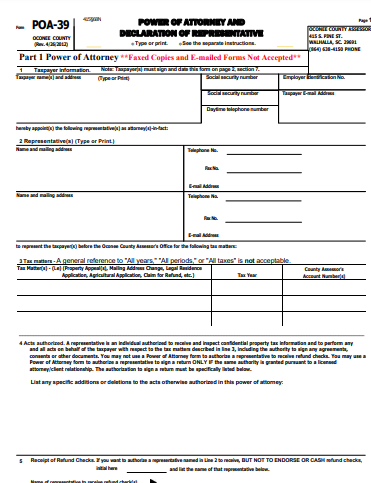
How do I get power of attorney in South Carolina?
To obtain a Power of Attorney in South Carolina, you must complete a POA form, specifying the powers granted to your agent. It’s crucial to choose a trustworthy individual as your agent. The form must be signed in the presence of a notary and, depending on the type, may require witnesses. Ensure the form complies with South Carolina’s legal requirements for validity.
Examples:
1. Financial POA:
Granting an agent control over financial matters, such as managing bank accounts.
2. Medical POA:
Appointing someone to make healthcare decisions if you’re incapacitated.
3. Durable POA:
Remains effective even if you become mentally incapacitated.
4. Springing POA:
Activates only under certain conditions, like a medical emergency.
5. Real Estate POA:
Authorizing an agent to handle real estate transactions.
What is the form for power of attorney in the US?
In the US, a Power of Attorney form is a legal document that authorizes another person to act on your behalf in specific matters. The form varies by state, reflecting local laws. It’s essential to use the correct form for your state to ensure it’s legally binding.
Examples:
1. General POA:
Covers a broad range of activities and decisions.
2. Special or Limited POA:
Restricted to specific tasks or timeframes.
3. Healthcare POA:
Designates someone to make medical decisions.
4. Financial POA:
For managing financial affairs.
5. Durable POA:
Remains in effect if you become incapacitated.
What is a 2848 form for power of attorney in SC?
Form 2848 in South Carolina is used to authorize an individual, usually a tax professional, to represent you before the IRS. This form is specific to tax matters, allowing your representative to receive confidential information and perform actions like negotiating a payment plan.
Examples:
1. Tax Filing Representation:
Authorizing an agent to file taxes on your behalf.
2. Tax Dispute Resolution:
Empowering an agent to handle tax disputes.
3. Tax Information Access:
Permitting an agent to access your tax records.
4. Negotiating Payment Plans:
Allowing an agent to negotiate with the IRS.
5. Attending IRS Meetings:
Authorizing an agent to represent you in IRS meetings.
How do I get power of attorney over a parent in SC?
To get a Power of Attorney over a parent in South Carolina, your parent must voluntarily sign the POA form, indicating their consent. It’s important they are mentally capable of understanding the document. The form should be notarized and, depending on the type, may need witnesses.
Examples:
1. Managing Finances:
If a parent is unable to handle their finances.
2. Healthcare Decisions:
Making medical decisions for an ailing parent.
3. Real Estate Management:
Handling property-related matters.
4. Personal Affairs:
Managing day-to-day activities and decisions.
5. End-of-Life Care Decisions:
Making decisions about life-sustaining treatments.
What is a limited power of attorney in South Carolina?
A Limited Power of Attorney in South Carolina grants specific, restricted powers to an agent. It’s used for particular tasks or for a set period. This POA is ideal for situations where you need someone to act on your behalf for a limited purpose or time.
Examples:
1. Single Transaction:
Authorizing an agent for a specific financial transaction.
2. Temporary Authority:
Granting powers while you’re out of the country.
3. Specific Legal Matter:
Handling a particular legal issue.
4. Real Estate Sale:
Managing the sale of a property.
5. Medical Procedure Consent:
Authorizing decisions for a specific medical treatment.
Is South Carolina an attorney state?
South Carolina is considered an attorney state for real estate transactions. This means that a licensed attorney must be involved in the closing process of real estate sales. The attorney ensures legal compliance and protects the interests of the parties involved.
Examples:
1. Real Estate Closing:
An attorney oversees the closing process.
2. Title Search:
Conducting a title search to ensure clear property title.
3. Legal Document Preparation:
Preparing and reviewing legal documents.
4. Dispute Resolution:
Handling disputes that arise during the transaction.
5. Legal Advice:
Providing legal advice related to the real estate transaction.
Can a power of attorney be revoked in South Carolina?
In South Carolina, a Power of Attorney can be revoked by the principal at any time, as long as they are mentally competent. The revocation must be in writing and should be notarized. It’s important to inform the agent and any institutions relying on the POA about the revocation.
Examples:
1. Written Revocation:
Drafting a formal revocation document.
2. Notarization:
Getting the revocation notarized for legal validity.
3. Informing the Agent:
Officially notifying the agent of the revocation.
4. Notifying Financial Institutions:
Informing banks and other institutions.
5. Public Record Filing:
Filing the revocation with public records if the POA was recorded.
How to Prepare a South Carolina Power of Attorney Form
Understanding the Basics of South Carolina Power of Attorney
Before diving into the preparation process, it’s crucial to understand what a Power of Attorney (POA) is. In South Carolina, a POA is a legal document that grants one person (the agent) the authority to act on behalf of another (the principal) in legal, financial, or health-related matters.
Step 1: Determine the Type of POA Needed
South Carolina recognizes different types of POAs, including General, Limited, Durable, and Health Care. Choose the one that best suits your needs. A General POA offers broad powers, while a Limited POA is for specific tasks.
Step 2: Selecting the Right Agent
Choose someone trustworthy and reliable as your agent. This person should have the skills relevant to the tasks they will perform, and they must be willing to act in your best interests.
Step 3: Drafting the POA Document
You can use a template or consult a legal professional to draft the document. Ensure it includes your name, the agent’s name, the powers granted, and the duration of the POA.
Step 4: Include Necessary Legal Language
South Carolina law requires specific language for a POA to be valid. This includes phrases that clearly state the document’s purpose and the powers granted.
Step 5: Signing and Notarization
The POA must be signed by the principal in the presence of a notary public. South Carolina may also require witnesses, depending on the type of POA.
Step 6: Storing the Document
Keep the original document in a safe place and provide copies to your agent and relevant institutions, like banks or healthcare providers.
Tips for Using Effective South Carolina Power of Attorney Form
Ensure Clarity in the Document
The POA should clearly outline the scope of authority granted to the agent. Avoid vague language to prevent misunderstandings and legal disputes.
Regularly Update the POA
Life changes, such as marriage, divorce, or relocation, can affect the relevance of your POA. Regularly review and update the document to reflect current circumstances.
Communicate with Your Agent
Maintain open communication with your agent. Discuss your wishes, expectations, and any specific instructions you have for handling your affairs.
Monitor the Agent’s Actions
Even after granting authority, it’s important to oversee the agent’s actions (if possible) to ensure they are acting in your best interest.
Revoke If Necessary
You have the right to revoke your POA at any time, as long as you are mentally competent. If you decide to revoke, do so in writing and inform any parties who had received the original POA.
Legal Consultation
Consider consulting a legal professional, especially for complex estates or business matters. They can provide guidance and ensure your POA complies with South Carolina laws.
By following these steps and tips, you can create an effective South Carolina Power of Attorney form that safeguards your interests and ensures your affairs are managed according to your wishes.
How do I get a South Carolina Power of Attorney template online for free?
To obtain a free South Carolina Power of Attorney template online, search for reputable legal websites or state government resources offering downloadable POA forms.
Why should I have a South Carolina PoA?
Having a South Carolina POA ensures your affairs are managed according to your wishes if you’re unable to do so yourself, providing peace of mind and legal clarity.
What are the different types of Power of Attorney forms used in South Carolina?
South Carolina recognizes several POA forms, including General, Durable, Limited, and Healthcare Powers of Attorney, each serving different purposes and needs.
Should I work with an attorney to review my South Carolina PoA?
Working with an attorney to review your South Carolina POA is advisable for legal accuracy, ensuring it meets specific needs and complies with state laws.
Would I need to do anything else after I draft a South Carolina Power of Attorney?
After drafting a South Carolina POA, ensure it’s signed, notarized, and shared with relevant parties, like your agent and financial or healthcare institutions.
Does a Power of Attorney need to be notarized, witnessed, or recorded in South Carolina?
In South Carolina, a Power of Attorney must be notarized, and depending on the type, it may also require witnessing or recording in certain circumstances.
Crafting a South Carolina Power of Attorney Form requires attention to detail and adherence to state-specific guidelines. This guide provides essential tips to ensure your document is legally sound and reflective of your intentions. Remember, a well-prepared Power of Attorney can offer peace of mind and clarity in decision-making, making it a crucial tool for effective estate planning in South Carolina.
Related Posts
-
10+ Free Nevada (NV) Power of Attorney Form Download – How to Create Guide, Tips
-
10+ Free Nebraska (NE) Power of Attorney Form Download – How to Create Guide, Tips
-
10+ Free Montana (MT) Power of Attorney Form Download – How to Create Guide, Tips
-
10+ Free Missouri (MO) Power of Attorney Form Download – How to Create Guide, Tips
-
10+ Free Minnesota (MN) Power of Attorney Form Download – How to Create Guide, Tips
-
10+ Free Mississippi (MS) Power of Attorney Form Download – How to Create Guide, Tips
-
10+ Free Massachusetts (MA) Power of Attorney Form Download – How to Create Guide, Tips
-
10+ Free Maryland (MD) Power of Attorney Form Download – How to Create Guide, Tips
-
10+ Free Maine (ME) Power of Attorney Form Download – How to Create Guide, Tips
-
10+ Free Louisiana (LA) Power of Attorney Form Download – How to Create Guide, Tips
-
10+ Free Kentucky (KY) Power of Attorney Form Download – How to Create Guide, Tips
-
10+ Free Kansas (KS) Power of Attorney Form Download – How to Create Guide, Tips
-
10+ Free Iowa (IA) Power of Attorney Form Download – How to Create Guide, Tips
-
10+ Free Indiana (IN) Power of Attorney Form Download – How to Create Guide, Tips
-
10+ Free Illinois (IL) Power of Attorney Form Download – How to Create Guide, Tips
